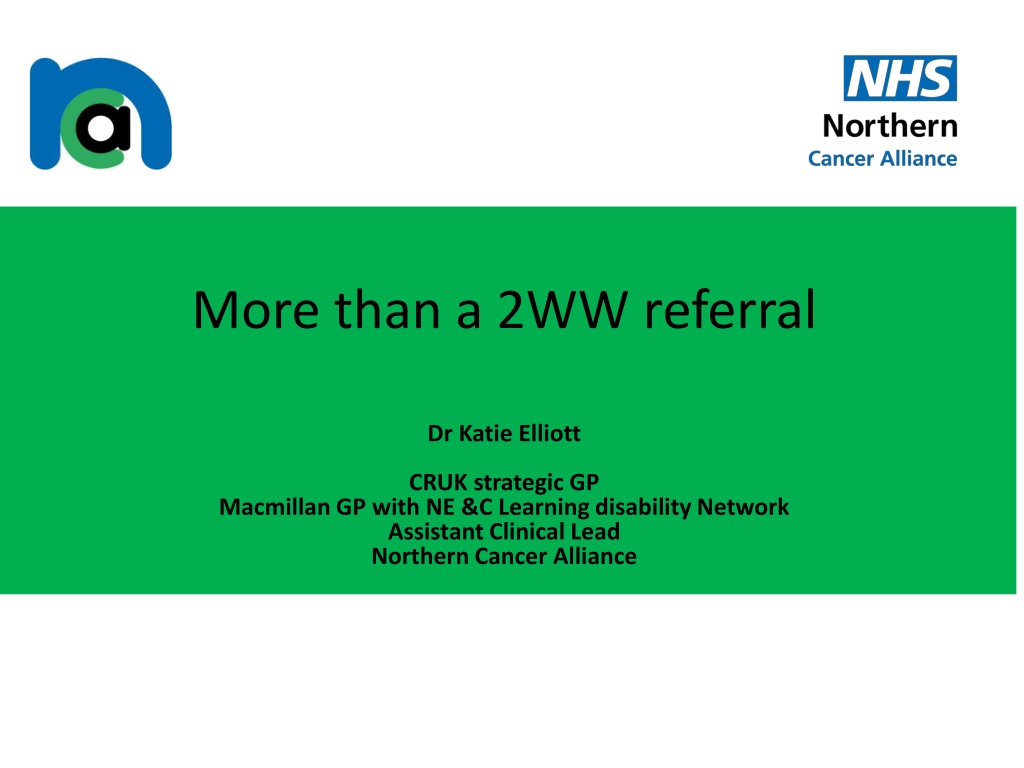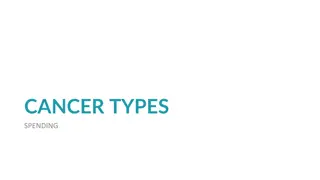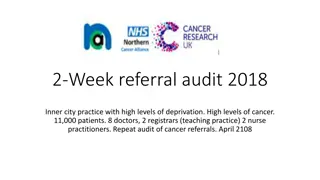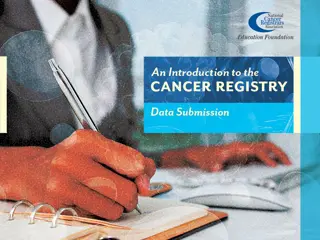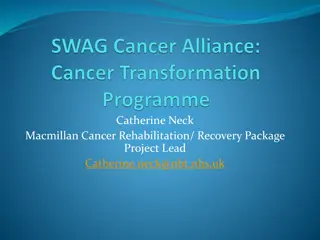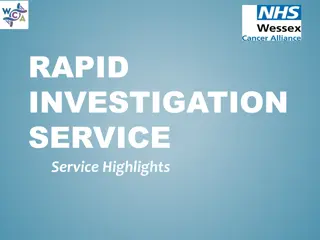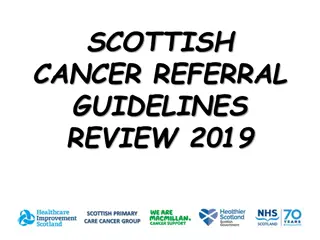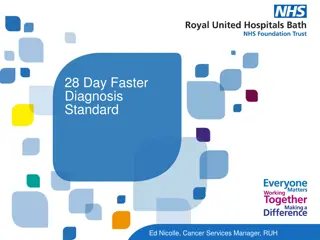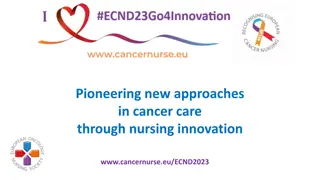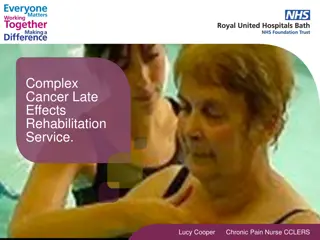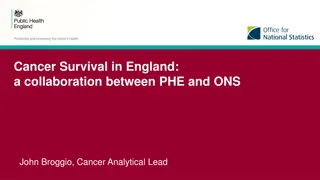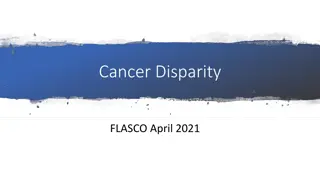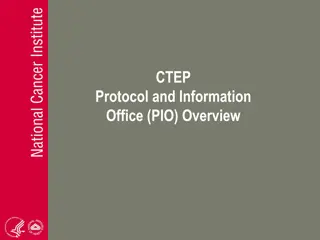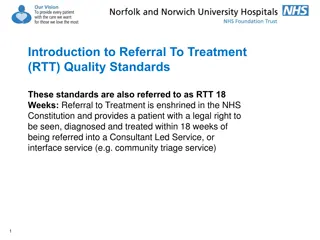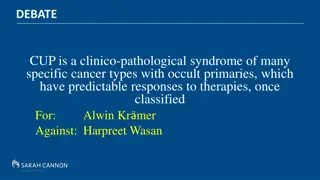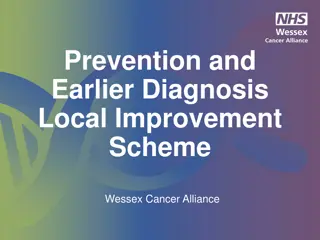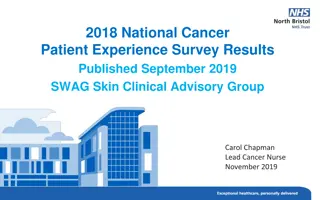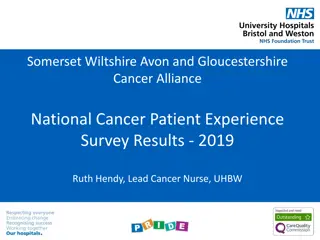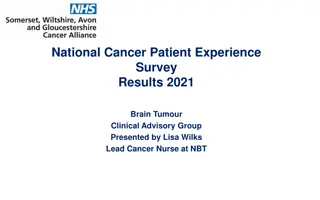Improving Cancer Referral Processes in Primary Care
Enhancing cancer referral processes in primary care settings is crucial for early detection and improved patient outcomes. This involves effective communication, standardized forms, straight-to-test pathways, and addressing feedback to ensure completeness and accuracy in referrals. Collaborative efforts aim to reduce variability, improve quality of information, facilitate direct access to tests, and enhance the overall patient experience.
Download Presentation

Please find below an Image/Link to download the presentation.
The content on the website is provided AS IS for your information and personal use only. It may not be sold, licensed, or shared on other websites without obtaining consent from the author. Download presentation by click this link. If you encounter any issues during the download, it is possible that the publisher has removed the file from their server.
E N D
Presentation Transcript
More than a 2WW referral Dr Katie Elliott CRUK strategic GP Macmillan GP with NE &C Learning disability Network Assistant Clinical Lead Northern Cancer Alliance
NICE NG12 Suspected Cancer: Recognition and referral Issued in June 2015 Identify more cancer at an earlier stage PPV 3% Increased emphasis on early referral/ direct to test in primary care Site Symptoms Primary care investigations Also includes Symptoms in children and young people Information and support for people with suspected cancer and their families Safety netting
Information and Support for patients and their families Tell people they are being referred/ investigated for suspected cancer. Explain what to expect from the referral/ investigation. Make reasonable adjustments - consider written information. Most people referred urgently will not have cancer. Collaborating to improve cancer care
Regional 2WW forms Regionally agreed - expert advisory groups/ Cancer in the community primary care input Integrated into GP clinical systems EMIS load direct (except in Newcastle and Gateshead where resource publisher is ) System one - join DCS organisational group ( can save editable version in S1) Aims Reduce variation Improve quality of referral information Facilitate straight to test pathways Improve patient experience Collaborating to improve cancer care
Straight to test vs Direct access Patient/ GP concern Non urgent symptoms / signs Criteria for 2ww referral NG12 Direct access 2ww tests Clinic Non urgent referral Safety net advice Advice and guidance Straight to Test Tests appointment Test Clinic appointment Collaborating to improve cancer care
Review feedback In general GPs are using the forms In secondary care, lots of inappropriate information coming through but also incomplete information about the referral. Variability of who is filling in the forms is contributing to incomplete information. Secondary care asking all the time for mandatory fields because of incomplete information. PERFORMANCE STATUS, BLOOD TESTS often missing Significant information governance risk because of the merged consultations. This option was removed from S1 forms last year and has now been removed from EMIS Collaborating to improve cancer care
Review and improvements Collaborating to improve cancer care
Performance status Essential to safely book straight to test Clinical information Performance 0 Fully active 1 Cannot carry out heavy physical work Status 2 Up and about more than half the day and can look after yourself 3 In bed or sitting in a chair for more than half the day and need help in looking after yourself 4 In bed or a chair all the time and need a lot of looking after Collaborating to improve cancer care
Results Collaborating to improve cancer care
Head and Neck Collaborating to improve cancer care
Skin Collaborating to improve cancer care
Colorectal Collaborating to improve cancer care
Urology Collaborating to improve cancer care
Upper GI Collaborating to improve cancer care
Challenges Old paper forms Old electronic forms Clinician / admin teams understanding the role of the 2ww form Clinician behaviour Patient behaviour DNA ( use of patient information leaflets) Variation in booking on eRS actual vs virtual / defer to provider/ fax How the secondary care systems work to handle the referral documents Safety netting Collaborating to improve cancer care
Northern Cancer Alliance 2WW forms Watch out for the new NCA forms and let the clinical and admin teams know. The RED boxes on the forms indicate where information is required Upper / Lower GI/ lung/ head and neck/ prostate pathways rely on the accuracy of the information on the forms to be able to book straight to test for CT/ colonoscopy/ MRI. Clinical criteria this has changed for HEAD and NECK and is now closer to NICE guidance. Upper GI - new hyperlink on form to advice for conservative management of low risk sx COLORECTAL - qFIT is included but is not available yet - COMING SOON UROLOGY MRI exclusion criteria are included to facilitate the new PROSTATE pathway Information to patients PIL/ Easy read Performance status should be completed by the referring clinician . This is essential to safely book direct to test pathways Clinical narrative must all be visible in the red box ( the box does not expand) Blood tests must be taken on the day/ before the day the referral is sent Accessible information make sure this is complete Remove inappropriate PMH Seek Support from your local CRUK facilitator DO NOT let incomplete referrals leave your practice
Implementation and Support for 2WW forms NECN/ Cancer Alliance website http://www.northerncanceralliance.nhs.uk/pathway/early-diagnosis/supporting-primary-care NICE website http://nice.org.uk/guidance/ng12 CRUK website for health professionals : http://www.cancerresearchuk.org/health- professional/learning-and-development-tools Clinical queries please contact katieelliott@nhs.net or your local cancer lead CRUK primary care engagement facilitator via http://www.northerncanceralliance.nhs.uk/pathway/early-diagnosis/supporting-primary-care Help with EMIS or System One or joining the DCS Group contact the NECS Training Team on 03005550340 Collaborating to improve cancer care
Thank you Working together Collaborating to improve cancer care
